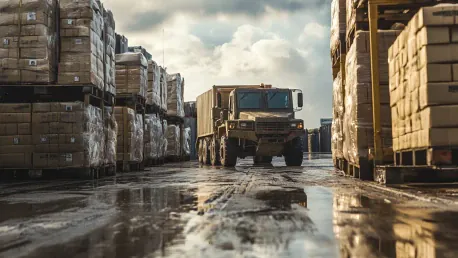In contemporary combat operations, the resilience of logistics capabilities plays a pivotal role in determining the success of military campaigns. Drawing lessons from recent conflicts, military strategists emphasize the necessity of a robust and adaptive logistics framework to maintain operational effectiveness and respond swiftly to unforeseen challenges. As warfare continues to evolve with technological advances and increasingly intricate enemy tactics, ensuring a resilient logistics network has become a cornerstone of modern military strategy. The current geopolitical landscape, particularly illustrated by the Russia-Ukraine conflict, serves as a seminal case study underscoring the importance of logistics resilience in sustaining prolonged military engagements.
Leveraging Regional Maintenance and Overhaul
To enhance logistics resilience, it’s essential to establish regional maintenance, repair, and overhaul (MRO) hubs near points of need. These hubs reduce transportation burdens and facilitate rapid, efficient repairs, which are critical to maintaining operational continuity. The Logistics Enabling Node in Poland, which supports the Armed Forces of Ukraine, illustrates the effectiveness of localized sustainment hubs. By securing supply chains and enabling local repairs, such hubs ensure that military units can maintain a high level of readiness and operational capability even in contested environments. This model underscores the strategic advantage of having repair and maintenance facilities closer to the areas where they are needed most.
The role of allied and global industry partnerships in setting up and managing these regional hubs is crucial. Through collaboration, nations can pool their resources and capabilities, thereby establishing a more resilient and interconnected logistics system. The Defense Logistics Agency (DLA) Europe & Africa, along with key figures like Army Col. Adrian Sullivan and Air Force Lt. Col. Russell Chance, highlight the significance of these partnerships. This cooperative approach not only mitigates potential disruptions but also enhances overall operational readiness. By working together, allied nations can create a support network that is flexible, reliable, and capable of adapting to the dynamic demands of modern warfare.
Embracing Collective Logistics
The concept of “collective logistics” involves the sharing of resources and logistics capabilities among allied nations to forge a stronger and more resilient logistics framework. This integrated approach is vital for supporting diverse military operations and adapting to evolving battlefield conditions. The ongoing Ukraine conflict has provided a clear example of the benefits derived from a collective logistics system, where multiple nations contribute different equipment and weapon systems. This shared effort facilitates a well-rounded and responsive logistics network, capable of addressing varied operational demands and ensuring continuous support for frontline units.
Effective data analytics are integral to the success of collective logistics. Predictive analytics enable military logisticians to forecast maintenance and spare parts requirements accurately, thus ensuring material availability and readiness. These capabilities are particularly crucial in managing the complex logistics associated with maintaining various weapon systems from multiple nations, optimizing the overall logistics support mechanism. By leveraging advanced data analytics, allied forces can predict potential logistics challenges and address them proactively, thereby enhancing the resilience and efficacy of their collective logistics framework.
Advanced Command, Control, and Coordination Systems
Advanced command, control, and coordination systems are vital for integrating the logistics needs of allied and partner nations. These systems enable the precise communication of supply requirements and facilitate timely responses, ensuring that necessary resources are delivered where they are needed most. For example, the Security Assistance Group – Ukraine, created by the U.S. in 2022, exemplifies this coordination by facilitating responses from allied nations to support Ukrainian logistics needs. A sophisticated database developed by the United Kingdom further enhances logistics coordination by providing accurate data on supply requirements, ensuring that allies can respond effectively with the appropriate resources.
The interoperable nature of NATO allies’ weapon systems underscores the importance of a coordinated logistics strategy. By fostering a unified logistics support framework, allied nations can mitigate the risks of supply chain bottlenecks and adversarial threats. This collaborative effort ensures a steady flow of necessary resources, enabling military operations to proceed smoothly. The coordinated efforts of allied nations in logistics management not only enhance operational readiness but also foster a more resilient and adaptive logistics system capable of meeting the challenges of modern warfare.
Learning from Challenges and Failures
In modern combat operations, the robustness of logistics capabilities is crucial for determining the outcome of military campaigns. By drawing on experiences from recent conflicts, military strategists highlight the need for a strong and adaptable logistics framework to ensure ongoing operational success and to quickly address unexpected challenges. As warfare evolves due to technological advancements and increasingly complex enemy tactics, maintaining a resilient logistics network has become a fundamental aspect of contemporary military strategy. The current geopolitical environment, exemplified by the Russia-Ukraine conflict, offers a significant case study on the importance of logistics resilience in sustaining prolonged military engagements. The ability to efficiently manage resources, supply lines, and support systems directly influences the effectiveness and longevity of military forces in the field. Therefore, investing in and continuously improving logistics capabilities is indispensable for modern militaries aiming to achieve strategic objectives in today’s dynamic and often unpredictable combat scenarios.









